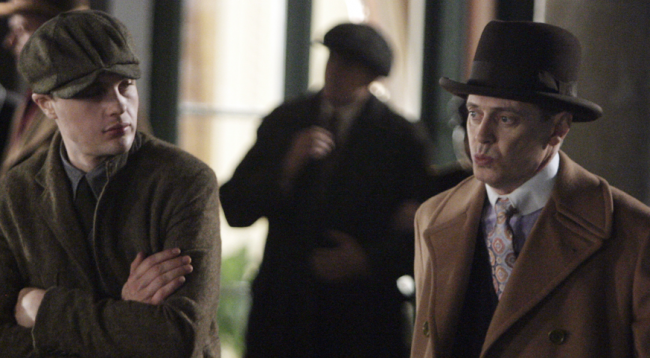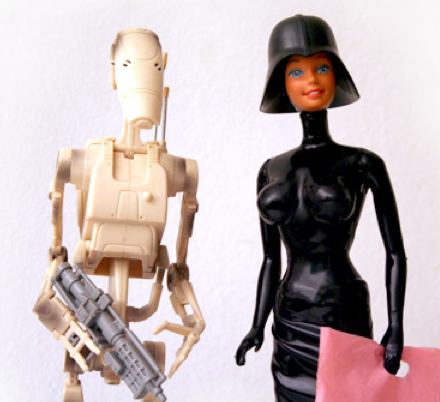"Boardwalk Empire": The Halfway Report
by Angela Serratore

This is the way history works on cable — the period setting is condensed, amplified and sped up so that we can focus on the interpersonal relationships and dramas of our heroes and villains. You add enough historical ephemera to keep people who watch for that reason interested, anyone tuning for a character drama gets a venue more exciting than a hospital or an LA apartment complex and everyone finds a person/place/thing to plug into Google at the end of the night.
The problem with the first quarter of “Boardwalk Empire” — the first three episodes of its first season of twelve — as a cable television show with a historical bent is that it did the opposite.
Sets and costumes and those Google-able tidbits were allowed to spread out and take up valuable character-development space, and the thing about TV is that no one wants to feel like they’re in school while watching their stories. Casual historians get annoyed because they think a lot of the expository stuff is a given, and having it explained and explained again makes them feel like they’re being treated as stupid. Boomers who pay for HBO On Demand don’t like to be stupid. The other viewers, the ones interested in drama and Slutty Prohibition Agent Halloween costumes? They got a little bored. The result: some channel-changing, and then no one types ‘Baby Incubation Boardwalk’ into their search engines.
In the opening chapter of “Boardwalk Empire,” by which we mean the book, on which the TV show is based, we meet Atlantic City treasurer and de facto emperor Enoch ‘Nucky’ Johnson as he is dispensing a kind of charity particularly favored by those with ties to organized crime. A shabbily-dressed pregnant woman whose husband can’t stay away from the dice games or the bottle, worried about getting her children through the off-season, is handed a wad of cash and a promise that her husband will be barred from Thompson-controlled gambling houses. It’s classic Robin Hood stuff, and it is not so interesting — we’ve all seen the power-hungry crook deliver Christmas hams to the underclasses, right?
The scene is played for television in a new way. Steve Buscemi as Thompson (changed from Johnson in the script) opens up to the woman (Kelly MacDonald, who manages to appear wounded and not-at-all simpering) about his dead wife and assuages her concerns about sounding like an immigrant. They make a real connection, and rather than a benevolent promise to keep her husband out of trouble, Johnson offers the man a chance to redeem himself. When he fails this test, Johnson’s brother beats him to death and tosses him off the side of a boat meant for running liquor.
It’s the same linear story, slowed down and spread out, and for this reason, “Boardwalk Empire” is both a compelling show and proof that television has positioned itself to be declared as an ideal vehicle for telling historical stories. This does raise a question — do we even want to watch historical stories on televison? Aside from “Mad Men,” which is a well-written, well-acted soap opera set in a non-contemporary time period, it’s a genre largely filled with shows people rave about but don’t watch enough to keep on the air (“Deadwood,” “Rome”) and shows that are basically soft-core porn with costumes (“The Tudors,” “Spartacus”). The general philosophy of most of these shows is to present a condensed historical narrative. The real work is creating whatever characters star in the story, and everything else is done shorthand — Henry VIII gets to brood with his minister and shoot with his friends. His wives get a season or less before they’re divorced or beheaded.
The show is concerned with presenting a historical narrative in the fullest way possible — anyone who saw co-executive producer Martin Scorcese’s recreation of the Five Points neighborhood in Gangs of New York and imagined that film without the knife-throwing and Cameron Diaz knows that Scorcese is a closet historian. Lingering shots of Probhibition-eve parties and bootlegging operations that, for time constraints and focus group attention-flagging, would have been cut from a feature film abound here. Scorcese and creator Terence Winter (like “Mad Men”’s Matthew Weiner) clearly delight in the idea that his project will inspire a new crop of footnoters — when, in Episode 3, Michael K. Williams’ Chalky White, the Nucky Thompson of Atlantic City’s black community, uses the word “motherfucker,” it prompts Thompson to wonder aloud where the phrase came from. To the Internet, everyone!
Factoids aside, Winter and Scorcese have their own lesson plan.
Take, for example, the inclusion of real-life organized crime figures. Usually rife with stereotypical guido posturing, these figures show up in movies about gangland and get three minutes to make themselves known, at which point audiences are supposed to laugh knowingly or cringe at the reduction of complex figures to props with bad Brooklyn accents. “Empire” avoids this trap by making Arnold Rothstein, Charles Luciano, and Al Capone (who is, it should be said, played by Brit Stephen Graham with grit and humor) series regulars. Rothstein is a tightly-wound teetotaler, Luciano a smoldering menace, and Capone a young driver hungry for the chance to sell out his bosses and make his own luck. We know the legends of these characters but the show is now beginning to prove its interested in interrupting our suppositions — that instead of simply pandering to an audience desire to be in on a joke, it’s going to tell us a story we don’t think we know.
And yet! Maybe reducing things to cliche is a way to preserve context without sacrificing narrative. On “Mad Men,” when Peggy Olsen finds herself in a psuedo-Factory loft downtown, the Warhol stand-in is cringeworthy in his embodiment of everything associated with that scene, but we don’t mind because we’re not there to learn about video installations — we’re there to watch Peggy learn about video installations. Surely assistants and interns spent hours digging through photos and invite lists to make sure that the party scene looked exactly as it was supposed to, but the filmed result is effortless; a feast for the eyes and ears, sure, but first and foremost a venue for character development.
Contrast that with, well, any expository scene from the first quarter of “Boardwalk.” When Thompson and protege Jimmy (Michael Pitt) tour a bootlegging operation attached to a funeral parlor, it reads like an AP History class video on the process of turning legitimate Canadian Club whiskey into something worse than moonshine, albeit an extraordinarily well-shot one. We learn nothing about Thompson or Jimmy that we didn’t already know, reinforcing the creeping sensation that they aren’t (yet) embodied with characteristics related to their era. In a pivotal scene from the first episode, young Jimmy warns his boss that it’s no longer possible to be “half a gangster,” but Thompson doesn’t feel like a part of American criminal society on the way out, Jimmy isn’t a harbinger of what’s to come, and the (still well-acted!) tension falls flat.
Pedanticism is always a tough sell. But! Its fastiduousness is at times luxurious (the sets, in particular, are masterful), especially to those of us who grew up playing games we’d invented after trips to historic house museums (yes, this is a thing). More importantly, “Boardwalk Empire” has been unveiling itself as a love story. We want Thompson and Schroeder’s budding romance to be real — for his desire to shift entirely from amazingly dumb nightclub floozies to this sensible, smart woman, and for her to find the happiness and respect the abused immigrant wife never gets. Instead, she waits by her new telephone like every lover of Don Draper or Tony Soprano, but more intensely, because waiting by the phone for your man to call wasn’t even a thing women did yet! And meanwhile, married government man Michael Shannon flagellates himself to her picture. Do either of these men love her? Do they posess the ability to love her more than they love power or Prohibition? Will Jimmy’s attachment to a Chicago prostitute and her gruesome demise (plus the four or so additional bodies he adds to his tally) quash any chance he has at a normal family life? Will Charles Luciano give himself chlamydia again once he learns he’s been sleeping with Jimmy’s mother?
So now you see there are questions about “Boardwalk Empire” that Google can’t answer.
And Nucky and Margaret and Jimmy are real people, and it’s hard to tell if the schoolmarmishness of the early episodes is wearing off or if the characters have caught up with it. I can’t be the only one who drew a sharp breath and made a mental note to further investigate when Margaret reads about douching with Lysol before returning to Nucky’s arms, can I?
It remains to be seen whether a show that takes its time getting its hooks in can be successful in Our Modern Times. I’ve yet to hear about people dressing up as Nucky Thompson for Halloween. Some people are even beginning to escape the sensation that, since season two is already promised, that we might as well watch through season one, as if it were our medicine.
Angela Serratore is a writer/historian in Los Angeles
What Does $45,000 in Dental Work Get You?
With regard to this tale of allegedly trading free dental work for placement in the New York Observer’s weekly “Playground” supplement, all anyone wants to know is: exactly how much dental work could possibly be worth $45,000? (We’re thinking the allegedly backroom deal-undoer has either eight gap-toothed children or she’s got some really badass grillz.)
What Should LeBron James Do?
Man, LeBron James’ existential crisis is sure gonna sell a lot of sneakers.
Florida Wants Our Water

Some New Yorkers swear the secret to their city’s great bagels and pizza is the water used in the dough — water that flows from clear reservoirs upstate right to their faucets.
It’s a belief that now has two Palm Beach County restaurants locked in a legal battle involving technology they claim can make water out of the tap here in South Florida taste like New York City drinking water.
The Original Brooklyn Water Bagel Co. in Delray Beach is accusing Mamma Mia’s Trattoria & Brick Oven Pizzeria in Lake Worth of misappropriating technology developed by the bagel restaurant to “Brooklynize” its water.
Strange stuff to be sure, but look the for the dog that didn’t bark: How did this article go out without a quote from Brooklyn Borough President Marty Markowitz? Someone on the Beep’s staff is probably clearing out his desk right now. [Via]
A Nice Millennial Wine
“The ads promote HobNob as just the right wine to go along with the busy, casual lives, filled with friends and entertainment, of the members of the generation known as millennials, Generation Y or echo boomers.”
— Enjoy your millennial wine.
What You Need To Know About Money
Maybe instead of learning everything you can about finance you should just follow a few handy rules of thumb for the things you really need to know. Sounds good to me! But then again I balance my checkbook by scanning through crumpled up ATM receipts, so I’m probably not the world’s best endorsement for the idea.
The Fantasy of Girl World: Lady Nerds and Utopias
by Sady Doyle


Here’s a story for you. It’s an old story, and it goes like this: There’s a place where we’re in charge. You’ve never seen it. You can’t visit. It doesn’t exist — it’s in the future, or it’s in the past, or it’s just sideways, outside our borders, somewhere no one has been. But us, the girls, we run everything there. There aren’t any men. Or: There were men, but we kicked them out. Or even: There are men, but they answer to us. This place is always threatened. This place is always on the verge of being invaded. This place is always just about to change. By the end of the story, the world of men will have reached us, and things will be different. But right now, here, at the beginning, there’s just us.
It’s not news that sci-fi and fantasy are about wish fulfillment. Nerd-dom — which we’ll define, generously but maybe not widely enough, as the ability to escape into one’s own obsessive interests, to claim realms of expertise and map them with care and detail and a certain degree of detachment from the reality that no one else cares as much as you do and everyone would like you to care a little bit less — has long been one of the culture’s most valuable escape hatches for the brainy, the young and the frustrated. Speculative fiction is aimed at nerds, and nerds want to find a place they belong. On the Enterprise, no one cares that you’re into space travel. It’s also not revolutionary to note that speculative fiction is basically sociology’s dream journal; when people tell stories about places and societies that might be, they tell us what they think societies are. What changes, what doesn’t and what should. But when girls get involved, stuff gets weird.
When we see the word “nerd,” we don’t think of women. We almost can’t. All of that geeky energy, that willingness to dive totally into your own anti-social obsessions, is diametrically opposed to our idea of what girls are for. There’s science involved, for one thing. And for another, girls aren’t sorted into cool or uncool; they’re sorted into likable and unlikable. The idea that a girl might follow the lonesome path of the nerd — not trying to fit in, not trying to be accepted, not trying to do anything but fight on the Internet about which “Doctor Who” was better — just contradicts what we all know, which is that for men, life is a sales job, and for women, it’s customer service. And yet! The girl nerds, they exist! And they tell their own stories. Stories about escape, about what changes, what doesn’t, and what should. And when it comes to lady nerds, those voluntary or involuntary gender rebels, those girls whose brains just don’t fit the template, they tell stories about the specific discomforts and desires of that situation. One of the oldest stories is the one where dudes don’t run things. Or, you know, exist.
Charlotte Perkins Gilman put the idea forth as early as 1915, in Herland, a novel about three dudely explorers who enter the not-at-all-subtly named Land Without Hims. Their first discovery consists of the fact that the women have short hair. Also, they wear pants. They soon find that not all of the women are hot, or young, which disturbs them greatly. By this point, the reader has made a discovery of her own, which is that these men are not very bright.
They do, however, demonstrate admirable patience when it comes to letting the women of Herland endlessly explain their society. If the revelation that women can put pants on is a shock, just imagine how startling it is to learn that, in Herland, boners are obsolete. Women reproduce parthogenetically — which is to say, with no need for a visit from Mr. Sperm. Here, a sample from the conversation:
“It would be so wonderful — would it not? To compare the history of two thousand years, to see what the differences are — between us, who are only mothers, and you, who are mothers and fathers, too. Of course we see, with our birds, that the father is as useful as the mother, almost. But among insects we find him of less importance, sometimes very little. Is it not so with you?”
“Oh, yes, birds and bugs,” Terry said, “but not among animals — have you no animals?”
“We have cats,” she said.
Yes. That is actually in there. They never have sex — their lack of sex drive is a major plot point — and they all love cats. WELCOME TO THE FEMINIST UTOPIA.
Goofy as this seems, Gilman was ahead of her time. Andrea Dworkin, notoriously, suggested that what women needed was “land and guns.” (Or non-violent resistance, but that gets less press.) Mary Daly wrote, in Gyn/Ecology, that “many feminists are actively interested in exploring the possibilities of parthenogenesis.” (They were?) Both pointed out the obvious fact that they didn’t need to stop having sex in order to stop having sex with men. The desire for a world where women were in charge was so powerful that some weren’t content to leave it for fiction, or even for the future; they projected it backward, into the past.
Consider Marion Zimmer Bradley’s The Mists of Avalon. Published in 1982, it’s faithfully feminist, and stunningly weird. Influenced by Marija Gimbutas-y mythology (once, there was a peaceful agrarian society of Goddess worshippers; then, monotheism wiped it out, co-opted its iconography and invented sexism), separatism (let’s all go to an island and get in touch with our girl power), and apparently Dune (psychic, politically ambitious nuns engaged in selective breeding to bring forth a male Messiah), it hangs them all on the legend of King Arthur, explaining that he was a male Messiah brought forth by psychic, politically ambitious Goddess worshippers who lived on Girl Power Island, AKA Avalon, that he and his sister Morgaine (as in “le Fay”) were mystically duped into having sex for selective breeding purposes, that they both reacted poorly, and that he subsequently went all Paul Atreides and rejected the Goddess worshippers, thus ensuring that Christianity and sexism would reign until the women’s spirituality movement emerged and ladies started writing books like The Mists of Avalon. Morgaine, an Avalon supporter, is the protagonist. She is not pleased.
The book says that the problem with Christianity is that it won’t tolerate other religions. It implies, however, that the problem with Christianity is that it’s a stupid jerk religion for assholes. The ladies in Avalon get psychic powers and meaningful jobs and top-notch liberal arts educations, whereas we manage to make it about three whole chapters into the book before a Christian dude beats his wife and things get all “be silent, you accursed scold” this and “have you put some spell upon my manhood, you accursed bitch” that and “you see what comes of your willfulness, my lady” the other. To argue that the book ultimately teaches religious tolerance is like arguing that old movie serials ultimately taught the importance of cooperation between virtuous maidens and dudes with capes and handlebar moustaches who enjoyed tying maidens to train tracks. Of course, medieval Christianity was deeply misogynist and intolerant, and so was medieval Britain. The crucial addition is a magic island full of twentieth-century Women’s Studies majors who can tell everyone else what they’re doing wrong and allow readers to feel superior in between the many sex scenes.
The fantasy of Girl World often feels like the feminist imagination taken to its most self-indulgent, hypocritical extremes. We stand for tolerance and egalitarianism, whereas the people who disagree with us are IGNORANT WIFE-BEATING MONSTERS. Women, if left on their own, would eliminate war, poverty, heartbreak and pets that are not cats. But, here’s a question for you: Why shouldn’t it look like this? What’s wrong with a wish-fulfillment fantasy that tells women they could do well with power and without oppression? What’s wrong with girls geeking out over the idea that they’re special?
Of course, stories can be dangerous; one of the most popular science fiction novels of the twentieth century is by a woman, after all, and it would be a completely harmless tale about a dystopian future and a death ray and a team of heroic scientists, except that it’s Atlas Shrugged. Taking writers’ work at face value can be dangerous too; Marion Zimmer Bradley spent the end of her life in court, accused of knowingly covering for her ex-husband’s pedophilia, which should serve to point out that no side of any debate has a monopoly on hypocrisy. And it’s easy to point out the flaws of the books themselves, political or otherwise.
But then, men have always told stories about female worlds too, from Hercules and Hippolyte to Queen of Outer Space to that one “Futurama” episode with Femputer, and these stories have usually ended with the women either voluntarily dismantling their society for boyfriends or being killed. The women who read these books want a break from reality like everybody else, and it’s no surprise that their fantasies look just as unfair and silly as men’s. Unfair, silly fantasies are one of the ways we’re all equal, it turns out. Speculative fiction is sociology’s dream journal; nerds want a place to belong; on the Enterprise, nobody cares if you’re into space travel. All women want from these stories is a place where nobody cares if they’re girls.
* * *
“The Smartest Thing She Ever Said” is a Tumblr based digital storytelling art project featuring four teams of two-one artist and one story editor-between now and the end of the year. For three weeks each, the teams were asked to interpret the phrase, “The Smartest Thing She’s Ever Said.” The current team features photographer Amanda Merton and writer Alice Gregory with support from project curator Alexis Hyde. ArtSheSaid.com and its artists are entirely supported by Ann Taylor in collaboration with Flavorpill.
Sady Doyle is the proprietor of Tiger Beatdown. This is part one in a series of three.
Photo from Flickr by Dirk Loop.
Bit.ly Is Forever
One of the possibly unintended consequences of URL-shortening services is that they linger. And linger. It’s great for some things — also it’s a way in which the Internet can be ever more filled with poorly aging trash URLs: “Even bit.ly/google isn’t what you’d think — it leads to a Picasa album of Google’s Zurich office (which looks great!).”
Don't Blame America For Syphilis

Science, clear me up some misconceptions, will ya? “Christopher Columbus and his crew have long been blamed for syphilis back from the Americas to Europe after their historic first voyage. In 1493 they returned to Spain bringing news of lands across the Atlantic and the first cases of the potentially deadly disease thanks to their exploits abroad, it was believed. But now scientists have found evidence that the disease existed in Europe long before Columbus was even born.” Gonococcocal urethritis, on the other hand… yeah, we’ll take the hit on that one.
